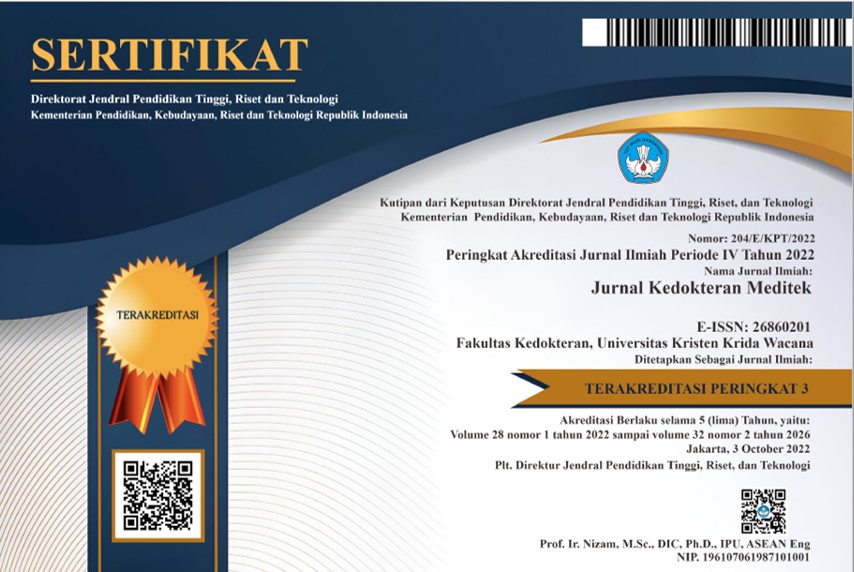Menghitung Escherichia coli Fekal dari Air Cucian Selada di Pasar Wilayah Kecamatan Grogol
DOI:
https://doi.org/10.36452/jkdoktmeditek.v23i61.1461Abstract
Abstrak
Makanan penting baik untuk pertumbuhan maupun mempertahankan kehidupan. Sayur lalapan memiliki kelebihan gizi karena dikonsumsi dalam keadaan mentah sehingga zat-zat gizi yang terkandung didalamnya tidak mengalami denaturasi atau perubahan. Tetapi manfaat dari sayur lalapan tersebut tidak akan berguna apabila sayur lalapan tersebut mengandung bakteri Escherichia coli fekal yang masuk ke dalam saluran pencernaan yang mengakibatkan Foodborne illness dan gejala diare. Untuk mengetahui suatu makanan aman atau tidak untuk dikonsumsi haruslah terlebih dahulu dilakukan pemeriksaan biologik yaitu melakukan isolasi dan identifikasi bakteri yang mengkontaminasi. Dalam penelitian ini kami mencoba mencari tahu apakah sayur lalapan selada yang dijual di pasar Wilayah Kecamatan Grogol, Jakarta Barat, terkontaminasi E. coli fekal, dengan cara mengetahui MPN Escherichia coli fekal pada air cucian sayur lalapan selada. Penelitian merupakan penelitian deskriptif laboratorium dengan pendekatan cross-sectional dan menggunakan teknik pengambilan sampel quota sampling. Pemeriksaan sampel dilakukan di Laboratorium Universitas Kristen Krida Wacana. Hasil penelitian menunjukkan bahwa dari 4 sampel yang diuji semua sampel penelitian ditemukan positif Escherichia coli fekal, hal ini membuktikan bahwa salada tersebut tercemar dengan tinja manusia.
Kata Kunci: Eschericia coli fekal, air cucian selada, Jakarta Barat
Abstract
Food is good and important for growth and life sustaining. The vegetable is trusted to have an excess of nutrition due to be consumed in the raw so that nutrition compounds do not damage or change. But the benefits of vegetables will not be useful if the vegetable is containing with faecal Escherichia coli that enters into the digestive track.The purpose of this study is to know whether there are faecal Escherichia coli bacteria that get into the digestive tract resulting in foodborne illness and diarrhea. To find the food is safe or not for consumption, we have to know that the food is free of fecal bacteria must first examination ie biological isolation and identification of bacteria that contaminate. In this study we tried to find out whether vegetable salad vegetables sold in the market area is Grogol, West Jakarta, contaminated with fecal E. coli, by analyzing and calculating the amount of faecal Escherichia coli in lettuce vegetables vegetable washing water. Laboratory research is a descriptive study with cross-sectional sampling and using a quota sampling technique. The laboratory test conducted at the Laboratory of the Krida Wacana Christian University. The results showed that all the four samples tested in this research found positive for fecal Escherichia coli, this proves that the lettuce is contaminated with human feces.
Keywords: Escherichia coli fecal, dishwater of lettuce, West Jakarta

















